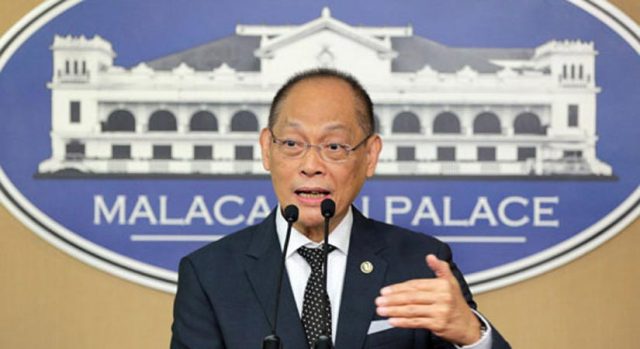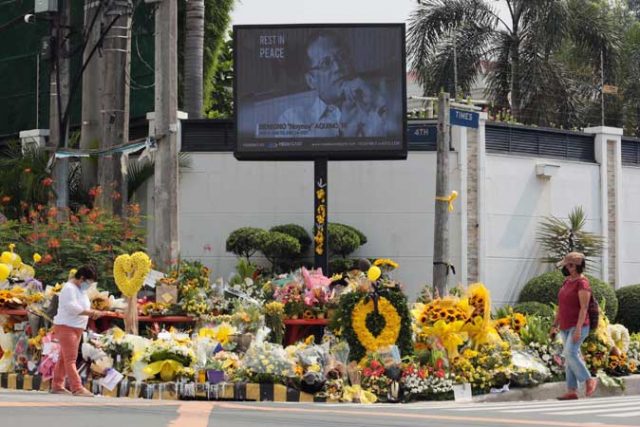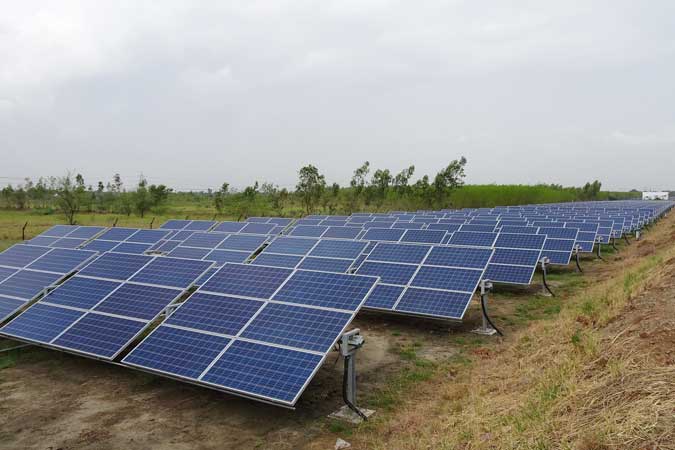By Kyle Aristophere T. Atienza, Reporter
LUDIVINA LECETIVO, 43, was one of the many Filipinos who were disgruntled by the Aquino government’s slow response to the destruction brought by Typhoon Haiyan (Yolanda) in 2013.
“But I realized that there’s no such thing as a perfect leader,” she said in a Facebook Messenger chat. “He proved his worth through his economic legacies,” she said of the late President Benigno S.C. Aquino III.
The former Philippine leader ran after tax evaders and unscrupulous officials, giving him more revenue to build roads and schools and boost cash aid to the poor while cutting debt.
 These efforts led to investment-grade credit ratings for the Philippines and economic growth exceeding 6% from 2012 to 2014.
These efforts led to investment-grade credit ratings for the Philippines and economic growth exceeding 6% from 2012 to 2014.
Ms. Lecetivo said she had hoped that President Rodrigo R. Duterte would continue the reforms started by his predecessor to improve government service. “I was wrong. I can’t tolerate foul mouth, indecency and misogyny.”
“I am now an ex-Duterte supporter.”
Political analysts think the opposition could attract voters like Ms. Lecetivo, with Mr. Aquino’s death likely winning public sympathy and galvanizing support for Mr. Duterte’s opponents at next year’s elections.
“Popular presidents’ deaths usually become a rallying cry for their supporters,” Jean Encinas-Franco, a political science professor from the University of the Philippines, said in a Facebook Messenger chat. “It becomes a unifying force to revive their legacy.”
The grief expressed by Filipinos on social media shows that some of them long for change, she pointed out.
Mr. Aquino, who sent his predecessor Gloria Macapagal-Arroyo and at least three senators to jail as part of his anti-corruption drive, died on June 24 at 61 due to renal disease secondary to diabetes. His cremated body was buried on Saturday alongside his parents at a cemetery in the Philippine capital.
“It remains to be seen to what extent his death will affect the 2022 elections, but I am sure the opposition is already looking for ways to make it work in their favor,” Ms. Franco said.
Members of the opposition should by now strategize, reorganize and prepare for the election battle next year, when Filipinos will vote for their next President, among other officials, campaign strategist Gerardo V. Eusebio said in a Facebook Messenger chat.
The death of the graft-busting former leader, who defied China by suing it before a United Nations-backed international tribunal for its island-building activities in the South China Sea, could be translated into popular support for a relative at next year’s elections.
In the absence of a political heir, popular support could be transferred to the political party that best identifies with him, said Mr. Eusebio, who teaches political science at De La Salle University.
“A direct beneficiary could be former Senator Paolo Benigno A. Aquino as a nephew of the late President, but I feel he might be a little wet behind the ears for the presidency,” he added.
Critical mass also might still be lacking.
“We can’t compare the outpouring of support that Ninoy, Cory, FPJ and Jesse Robredo that catapulted Mr. Aquino, Senator Grace Poe and Vice-President Maria Leonor G. Robredo to power,” Mr. Eusebio said. “It is now up to the campaign consultants and strategists to do their jobs.”
The son of ex-President and “People Power” icon Corazon C. Aquino was thrust into the political limelight on a massive outpouring of grief following her death in August 2009. He beat his rivals in the presidential race despite a rather undistinguished legislative career.
Mr. Aquino, like his parents, came from pedigreed stock — landed, aristocratic families that have long been part of the ruling elite. His 2010 campaign was based on a legacy far greater than his own.
Aside from having the first female Philippine president for a mother, his father Benigno Jr. was the country’s greatest democracy champion before he was assassinated in 1983 presumably by agents of the dictator Ferdinand Marcos. Corazon ended Marcos’s two-decade rule in the popular uprising of 1986.
Like Mr. Aquino, Ms. Poe received popular support when she ran for senator in 2013, years after her adoptive father and movie icon Fernando Poe, Jr. died. Before his death, he ran for President in May 2004 and lost, allegedly amid cheating.
Meanwhile, Ms. Robredo won a congressional seat also in 2013, less than a year after the death of her husband Jesse Robredo, famous for transforming Naga City in central Philippines into one of Asia’s most improved cities when he was its mayor.
President Rodrigo R. Duterte’s handling of the coronavirus pandemic would be key to either negating the effect of Mr. Aquino’s passing or fueling a clamor for change, said media research expert Jay Bautista.
“Will the cash aid, gradual opening of the economy and vaccine rollout be enough to keep the population from replacing the status quo?” he asked.
“A lot of variables are at play now, unlike in 1986 and 2010 when the passing of an Aquino was succeeded by another Aquino,” he said. “Right now, the opposition is not led by an Aquino unless Kris his sister, or Bam comes into the picture.”
The opposition could bank on Mr. Aquino’s strong anti-corruption drive, which gained popular support during his time, Victor Andres Manhit, president of a local policy think tank, said by telephone.
The opposition or any alternative candidates “should question the actions taken in the past five years, including the Duterte administration’s pandemic response,” he pointed out.
The opposition should also elevate efforts to counter misinformation that demonize the past administration’s good governance reforms and other legacies, Mr. Manhit said.
‘OLD POLITICS’
Granted, while the politics of Mr. Aquino represented the promise of the post-EDSA democracy, it also betrayed its limits.
Mr. Aquino initiated key government reforms during his presidency, but they were not enough, said Cleve Kevin Robert V. Arguelles, a political science lecturer at De La Salle.
Despite his crusade against corruption, Mr. Aquino failed to dismantle patronage politics that weakens the delivery of public service, he said in a Facebook Messenger chat.
“The most important lesson of his six years in power is that a President cannot lead a reform coalition while keeping the masters of old politics happy,” he said.
Mr. Aquino “attempted to use his cross-class popular appeal to mobilize public support for anti- corruption and good governance reforms,” Mr. Arguelles said. “But his reformist agenda was frustrated by his ties to old politics.”
“Aquino’s success was in his reformist policies, but his failure was in insisting that reform could be done without changing our elite-dominated political system.”
Political analyst Antonio Gabriel M. La Viña said the bereaved president “did not go far enough and ultimately the reform agenda faltered.”
Mr. La Viña, former dean of the Ateneo De Manila School of Government, said Mr. Aquino failed to institutionalize key political reforms because his political party, like other political groups at that time, was dominated by traditional politicians. “Our politics is much worse now than in 2016.”
Mr. Aquino tried to fulfill the promises of the 1986 street uprising led by his mother by enforcing transparency and accountability in government, but he was overwhelmed by the oligarchy, bureaucratic inefficiency, and disasters beyond the control of humans, Mr. Eusebio said.
“He meant well but probably lacked the resolve and political acumen in some sensitive issues,” he said. “Elitist politics and oligarchic strangleholds were largely the culprits.”
Ana Patricia C. Paje, 29, was not a fan of Mr. Aquino’s deregulation and privatization policies, as well as his handling of the hostage crisis involving Hong Kong tourists in 2010 and the massacre of 44 police commandos by Muslim rebels in 2015.
“I would not say that I hated him, but I was very much against the policies he enforced,” she said in a Facebook Messenger chat.
Neither did she vote for Mr. Duterte. She thinks that while Mr. Aquino had his faults, the country under his administration was better.
She said she started to appreciate the late President’s legacies after his death. “If back then I was on the far end of the political spectrum, I am less radical now.”





 These efforts led to investment-grade credit ratings for the Philippines and economic growth exceeding 6% from 2012 to 2014.
These efforts led to investment-grade credit ratings for the Philippines and economic growth exceeding 6% from 2012 to 2014.








